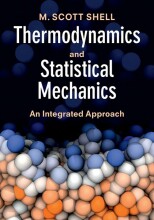Summary: Thermodynamics And Statistical Mechanics An Integrated Approach | 9781316123324 | M Scott Shell
- This + 400k other summaries
- A unique study and practice tool
- Never study anything twice again
- Get the grades you hope for
- 100% sure, 100% understanding
Read the summary and the most important questions on Thermodynamics and Statistical Mechanics An Integrated Approach | 9781316123324 | M. Scott Shell
-
2 Equilibrium and entropy
-
2.1 What is equilibrium?
-
Which three statements hold for the conditions at thermodynamic equilibrium?
1. Properties do not change with time.
2. The history of the system doesn't matter.
3. The properties of copies of the same system are identical. -
What is meant by average properties?
1. The average properties are macroscopic properties such as pressure or mean density.
2. The properties are measured over a much larger time frame than molecular movement time scale. -
What are microscopic properties?
Microscopic properties only apply to one molecule. -
What are macroscopic properties?
Properties that are on the characteristics of the bulk. -
Why is thermodynamics not purely about heat and energy?
Thermodynamics deals with the equilibrium properties of a system. Heat and energy are merely ways for molecules to interact. -
2.2 Classical thermodynamics
This is a preview. There are 10 more flashcards available for chapter 2.2
Show more cards here -
Which macroscopic variables are a consequence of equilibrium?
Heat, Temperature and Entropy -
Why is the term 'disorder' wrong for entropy?
There is an elegant mathematics behind entropy and there are enough examples to counter the notion that higher entropy leads to more disorder. Such as the folding of enzymes. -
Where does the internal energy come from?
The internal energy exists from the kinetic and potential energies in all molecules in the system. -
What is the difference between the function for entropy for a single-component isolated system and a multi-component system?
For a single-component system
For a multi-component system -
Why does entropy depend on E, V and N?
Because in an isolated system these are very constant, because there is no heat, volume or mass transfer.
- Higher grades + faster learning
- Never study anything twice
- 100% sure, 100% understanding
Topics related to Summary: Thermodynamics And Statistical Mechanics An Integrated Approach
-
Equilibrium and entropy - Classical thermodynamics
-
The fundamental equation - Differential and integrated versions of the fundamental equations
-
The fundamental equation - Intensive forms and state functions
-
Gases - Thermodynamic properties of ideal gases
-
Gases - Ideal gas mixtures
-
Gases - Nonideal or "imperfect" gases
-
Solutions: fundamentals
-
Solutions – advanced and special cases - Phenomenology of multicomponent vapor-liquid equilibrium
-
Solutions – advanced and special cases - Flash calculations at constant pressure and temperature
-
Solutions – advanced and special cases - Nonideal mixtures
-
Solids - General properties of solids
-
Solids - Solid-liquid equilibrium in binary mixtures































